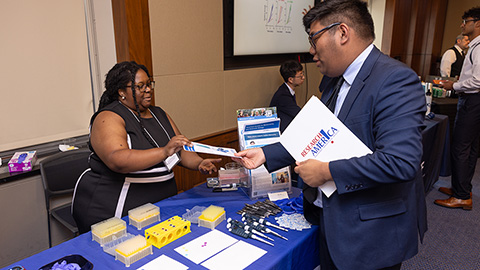ASBMB seeks feedback on NIH plan to change grant review criteria, scoring
The American Society for Biochemistry and Molecular Biology is seeking feedback on a National Institutes of Health proposal that would change the way peer reviewers evaluate grant applications. The society’s survey will close Feb. 28.
The NIH Center for Scientific Review issued a solicitation in December for public input on a proposed revised framework that would reduce the number of review criteria and change how they are scored.
The goal is two-fold. First, the NIH seeks to emphasize research merit and reduce emphasis on the reputation of the applicant investigators and their institutions. Second, the NIH seeks to reduce the administrative burden on study section volunteers.
Change is needed
The peer-review process ensures that the NIH funds excellent grant applications that will lead to important discoveries.
Reviewers who serve on study sections lend their expertise to evaluate the scientific merit of research proposals. However, some struggle to distinguish between significance and innovation; others have criticized the peer-review process for enabling reputational bias, which disadvantages grant applicants from underrepresented racial groups and low-resourced institutions.
Over the past decade, the peer-review process has become increasingly burdensome on reviewers, who now must also evaluate compliance forms and nonscientific materials.
What’s different?
The CSR Simplifying Review Criteria Workgroup proposes reducing the number of categories reviewers must evaluate and that reviewers focus on two major questions: “Should it be done?” and “Can it be done well?”
In addition, the working group proposes removing individual scoring for the investigator and environment. Instead, reviewers would qualitatively evaluate an applicant’s expertise and resources with ratings ranging from “fully capable” to “additional resources needed.”
If a reviewer finds inadequacies, they would have to justify them in writing. Notably, the applicant would have a chance to rebut concerns raised about expertise and resources.
Reviewers also would be required to provide a written justification for their overall score.
This approach is designed to shift the focus of grant review from investigator and institutional reputation to the merit of the proposed research, thereby reducing positive bias, to align with the CSR’s initiative to reduce bias in peer review.
Furthermore, study section volunteers would review less material from the “Additional Review Considerations” section of the application.
The ASBMB supports the NIH’s efforts to reduce bias in peer review and administrative burden on reviewers.
The public affairs team will collect feedback on the proposed framework through Feb. 28 and incorporate it into the society’s response to the NIH request for information.
Enjoy reading ASBMB Today?
Become a member to receive the print edition four times a year and the digital edition monthly.
Learn moreGet the latest from ASBMB Today
Enter your email address, and we’ll send you a weekly email with recent articles, interviews and more.
Latest in Policy
Policy highlights or most popular articles

Embrace your neurodivergence and flourish in college
This guide offers practical advice on setting yourself up for success — learn how to leverage campus resources, work with professors and embrace your strengths.

ASBMB honors Lawrence Tabak with public service award
He will deliver prerecorded remarks at the 2025 ASBMB Annual Meeting in Chicago.

Summer internships in an unpredictable funding environment
With the National Institutes of Health and other institutions canceling summer programs, many students are left scrambling for alternatives. If your program has been canceled or delayed, consider applying for other opportunities or taking a course.

Black excellence in biotech: Shaping the future of an industry
This Black History Month, we highlight the impact of DEI initiatives, trailblazing scientists and industry leaders working to create a more inclusive and scientific community. Discover how you can be part of the movement.

ASBMB releases statement on sustaining U.S. scientific leadership
The society encourages the executive and legislative branches of the U.S. government to continue their support of the nation’s leadership in science.

ASBMB and advocacy: What we accomplished in 2024
PAAC members met with policymakers to advocate for basic scientific research, connected some fellow members with funding opportunities and trained others to advocate for science.


